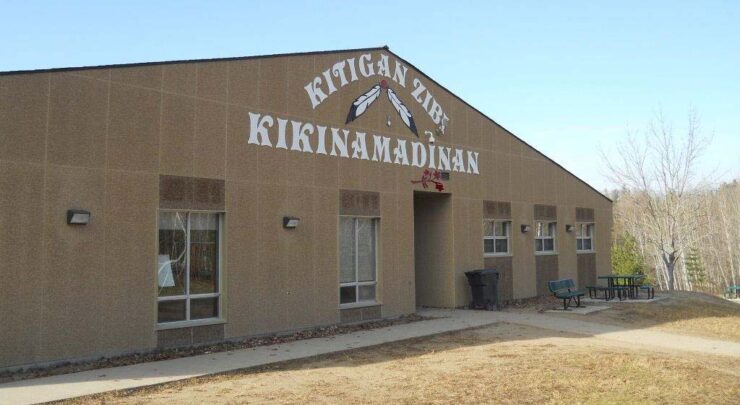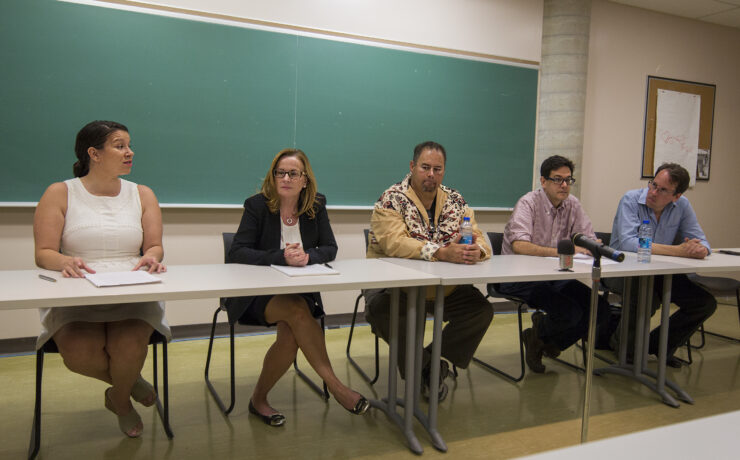Apologies sound nice but governments are still ignoring Indigenous voices in 2020
One of the most recognizable acts of activism observed by non-Indigenous Canadians all over the country today is land acknowledgments. But while they are a way to reflect on Canada’s colonialist past and history of broken treaties, they fail to address its colonialist present and our collective lack of action when it comes to indigenous issues.
Colonialism is deeply rooted in Canadian culture, both English and French Canada have failed the Indigenous in numerous ways. Our ancestors have used and exploited the Indigenous people of this land to their own benefits while completely ignoring their needs.
For over a hundred years, the Canadian government in cohorts with different sects of Christianity kidnapped Indigenous children from their communities all over the country, sending them to residential schools to rid them of their culture and assimilate them within Caucasian Canadian society.
“These residential schools were created for the purpose of separating Aboriginal children from their families, in order to minimize and weaken family ties and cultural linkages, and to indoctrinate children into a new culture—the culture of the legally dominant Euro-Christian Canadian society, led by Canada’s first prime minister, Sir John A. Macdonald,” says the Final Report of the Truth and Reconciliation Commission of Canada (TRC).
The estimated number of children that were stolen from their families and taken to residential schools is 150,000 according to the TRC. The TRC believes 4,200 children died in the residential school system; survivors testified to being abused in numerous, horrendous ways.
Last year on Orange Shirt Day, the National Centre for Truth and Reconciliation unveiled a 47-meter long red banner with the names of 2,800 children who died in the residential school system.
“Child neglect was institutionalized, and the lack of supervision created situations where students were prey to sexual and physical abusers,” reads the report. “Once in the schools, brothers and sisters were kept apart, and the government and churches even arranged marriages for students after they finished their education.”
The government’s reasoning behind residential schools was based on the “assumption that European civilization and Christian religions were superior to Aboriginal culture, which was seen as being savage and brutal.” In retrospect, a very ironic assumption given the way Indigenous children and communities as a whole were treated in what was cultural genocide.
Although the TRC’s report came out in 2015, the report contained 94 calls to action, most of which are still being ignored by municipal, provincial, and federal governments in Canada.
Despite the last residential school closing in 1996 in Saskatchewan, Indigenous communities face numerous traumas to this day that can be linked to their impact and the Canadian government’s colonial assumption that led to their creation.
We can start with the fact that the federal government keeps ignoring the numerous drinking water advisories that plague Indigenous communities. One of Justin Trudeau’s big electoral promises in the 2015 federal campaign was to end all water advisories by March of 2021. As of today, 88 drinking water advisories have been resolved, however, there remains 61 active drinking water advisories south of the Canadian Territories.
According to the Council of Canadians, a grassroots social action organization advocating for clean water, fair trade, green energy, public health care, and vibrant democracy, “the Trudeau government committed to ending these water advisories by 2021, but very little progress has been made and the needed funding has not been committed to end this crisis.”
According to the council in May 2018, there were 174 drinking water advisories in over 100 different indigenous communities across the country. Some of the drinking advisories date as far back as 1995.
This is unacceptable, access to “safe, acceptable, and affordable water” is a right guaranteed by the United Nations. This lack of attention can directly be attributed to the government’s neglect towards Indigenous people’s living conditions. The fact that this is not national news is insane, if a white suburb had had a water advisory for 25 years, Canada would be considered a third world country.
Moving on from drinking water advisories to pipelines, and land rights. Earlier in 2020, most people will remember efforts by the Wet’suwet’en hereditary chiefs and their supporters to prevent the construction of a natural gas pipeline on their ancestral lands in British Columbia.
In spite of consultations, the federal and provincial government ignored their opposition and decided to go forward with the project which led to mass protests and blockades of railroads around the country as the Royal Canadian Mounted Police (RCMP) forcefully entered Wet’suwet’en land. This opened a national debate on who really controls Indigenous lands in Canada? An imposed elected council or hereditary leaders or chiefs – colonial imposed democracy or traditional hereditary Indigenous leaders?
However, for a lot of people, this was another example of the government ignoring Indigenous voices to impose a pipeline that will ultimately benefit non-indigenous Canadians.
The RCMP is another government institution that has mistreated Indigenous peoples for hundreds of years. Since the Wet’suwet’en a number of other examples of RCMP cruelty towards the Indigenous have been reported.
In March, Athabasca Chipewyan First Nations Chief Allan Adam was allegedly beaten over an expired licence plate in Fort McMurray, Alta. In June, the Legal Services Board of Nunavut reported more than 30 allegations of misconduct, abuse and inhumane treatment of Inuit, especially women, at the hands of Nunavut RCMP.
However, one of the most problematic instances of systemic racism from the RCMP has to be the lack of action displayed in investigating the disappearance of 1017 women and girls who disappeared between 1980 and 2012. A figure from the RCMP that is believed to be underreported by the National Inquiry into Missing and Murdered Indigenous Women and Girls report and keeps rising as 130 Indigenous women and girls have disappeared between 2016 and 2019
Another sad example of how a Canadian institution has failed Indigenous living in Canada.
This past month also saw more conflicts arise.
In Quebec, members of the Algonquins of Barriere Lake imposed a Moose Moratorium to stop sport hunters from hunting moose on their traditional territories and taking food off their tables as they rely on hunting moose to feed themselves with the closest grocery store an hour and a half drive away from their community.
In Nova Scotia, the Sipekne’katik first nations were met with fierce opposition when they exercised their Supreme Court acquired right to ‘moderate livelihood’ by launching their own Mi’kmaq-regulated, rights-based lobster fishery.
With all that said (plus the many other factors we didn’t touch on) it’s clear that colonialism is still alive and well in Canada. There’s no denying it and land acknowledgments alone aren’t going to fix it. Our governments, whomever they may be, have not made enough efforts to help Indigenous peoples. There have been some (mild) efforts, but we are still ways away from complete reconciliation and a country where living conditions and opportunities are the same for Indigenous and non-indigenous people.
So as a non-Indigenous individual, what can we do to really try and move the needle?
There are many ways, the main one is monetary, there are a number of not-for-profit and charity organizations that aim to help Indigenous communities.
Another way is to volunteer, there are a number of programs that aim to help Indigenous people. A good way to help if you’re a professional is to donate time with training in your field or with pro bono work.
Attending and supporting Indigenous events is also a great way to support Indigenous artists and performers.
Finally, calling your MP and MPP asking them for action is a great way to pressure elected officials into developing policies and programs that help Indigenous people.
As students here is a list of things you can ask your MP and MPP to address, drawn directly from the TRC’s 94 Calls to Action to help improve the educational experience of our Indigenous peers.
-Call your MP to develop legislation to provide adequate funding to end the backlog of First Nations students seeking post-secondary education.
-Call your MP and MPP to develop culturally appropriate early childhood education programs for Aboriginal families.
-Call your MP to draft legislation to develop culturally appropriate curricula with the full participation and informed consent of Aboriginal peoples.
-Call on your MP to draft legislation with the full participation and informed consent of Aboriginal peoples on protecting the right to Aboriginal languages, including the teaching of Aboriginal languages as credit courses.
Editorials are written by the Fulcrum’s thirteen-person editorial board and express the shared opinion of Fulcrum’s editorial staff. To share your own views, email editor@thefulcrum.ca




